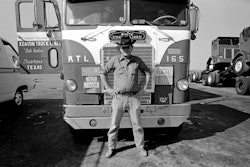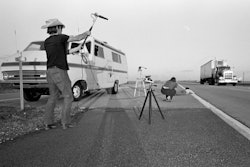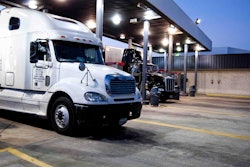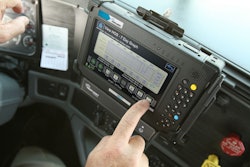Back in the mid-1970s San Francisco, some 20-something friends were seeing what they could accomplish with photography and video.
“We were really into documenting different aspects of American culture we didn’t know much about,” recalls Lynn Adler, part of the film collective that called itself Optic Nerve.
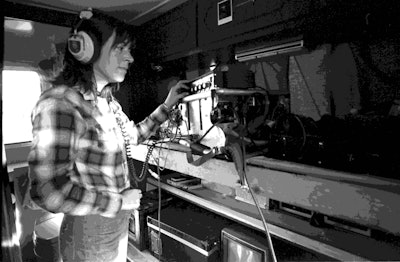 Lynn Adler monitors sound for an Optic Nerve production in the 1970s. © Optic Nerve
Lynn Adler monitors sound for an Optic Nerve production in the 1970s. © Optic NerveThey did a documentary on California rodeo cowboys. They did one on a California beauty pageant.
And with trucker shutdowns in the 1970s being in the news, Optic Nerve seized the opportunity to interview truckers and exhibitors in 1974 at the 10th International Truck Show in San Francisco.
“One thing that attracted us to the independent owner-operator is that was what we were,” being struggling independent filmmakers, Adler says. She continued to work in film as a partner in Ideas in Motion and in recent years has worked independently as archival researcher on feature documentaries.
Some excerpts from an International Truck Show video (see it below) indicate the Optic Nerve crew – asking truckers and exhibitors if they read Overdrive – was well aware of Overdrive’s role in the 11-day shutdown that had taken place a few months earlier.
Talking with drivers at the truck show “kind of got us motivated,” Adler recalls. So Optic Nerve planned a much more in-depth look at the careers and lifestyles of owner-operators.

They came across a small motor home available for cheap rent for six weeks. “So we drove across the country, five people in this motor home,” Adler recalls. “We basically camped out in truck stops, met a lot of people, ended up being invited to a lot of truckers’ homes.”
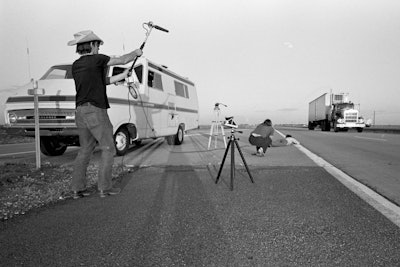 The Optic Nerve crew, working from their motor home, records trucking footage. © Lynn Adler
The Optic Nerve crew, working from their motor home, records trucking footage. © Lynn AdlerThe five, armed with press badges from their hometown PBS station, were welcomed into truck stops to spend the night. “Which I have to say was not a lot of fun, with trucks going 24/7,” she says.
“We had a CB, we got into CB radio lingo, we all had handles,” recalls Adler, whose handle was Chili Pepper. “We had some very hysterical conversations. We’d say what we were doing and people were amused. That’s one of the ways we met people. They’d say pull over at this truck stop and we’d meet them. All I can say is it was a lifestyle for the young and adventurous. For six weeks I think we got very little sleep.”
Interviews also took place elsewhere, including truckers’ homes. That led to interviews in southern California, Texas, Louisiana, North Carolina, Delaware and elsewhere.
“A lot of these guys have sort of an illusion of ‘I will be independent and get my own rig, and nobody’s going to tell me what to do. It’s like I’m not working a factory, not punching a clock,’” Adler says. But the reality was “sometimes you wouldn’t have any work. If they couldn’t make their payments, that was it, they could lose their rig.”
Truckers were eager to see their recorded interviews on videotape, still a new technology at the time, so they’d often come in to the trailer. They were served coffee made from “beans we ground, which were really strong.” The truckers, used to truck stop coffee, “were blown away by that.”
Their subjects often returned the hospitality. “We certainly were offered our share of pills. We did try some. We were trying to keep up with these guys.”
Spending that much time with the truckers, the filmmakers learned about CB lingo and truck makes, such as “K-whoppers.”
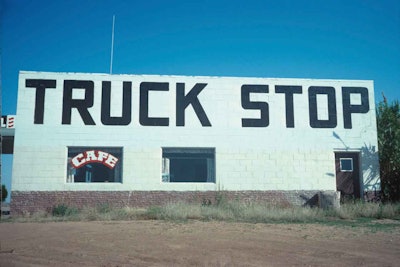 Independent truck stops, such as this one photographed by Optic Nerve, were far more common in the 1970s. © Lynn Adler
Independent truck stops, such as this one photographed by Optic Nerve, were far more common in the 1970s. © Lynn Adler“We all had our favorites,” she says. “Several truckers explained to me the difference, the reasons why they liked one over the other. Even now, out on the freeway, I’ll see a rig, and I’ll say, ‘Look at that rig!’ and people say, ‘What are you talking about?’ It was a kind of amazing experience and I’m very glad we did that project.”
Material gathered on the six-week jaunt was edited into a half-hour documentary, “On the boulevard,” that portrayed the everyday world of trucking through interviews with owner-operators. It had limited airing on PBS stations in the late 1970s and has been largely overlooked since.
In Wednesday’s blog, I’ll share more about “On the boulevard,” including a link to the video and Adler’s photos of truckers featured in the documentary.
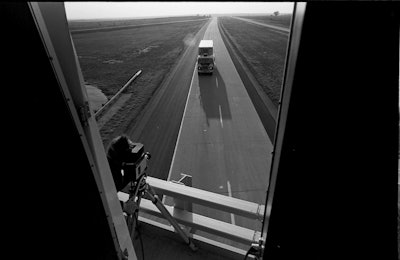 The motor home’s mirror shows Optic Nerve’s Mya Shone, shooting a truck. © Lynn Adler
The motor home’s mirror shows Optic Nerve’s Mya Shone, shooting a truck. © Lynn Adler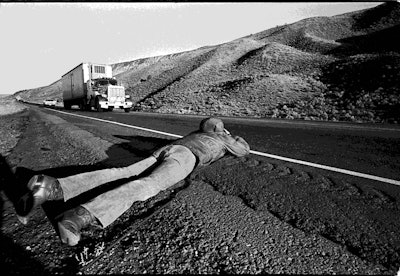 John Rogers gets closeup footage for the Optic Nerve documentary “On the boulevard.” © Lynn Adler
John Rogers gets closeup footage for the Optic Nerve documentary “On the boulevard.” © Lynn AdlerAn Overdrive magic show, plenty of comments about Overdrive magazine and thoughts on a major trucking shutdown (“The next step is anarchy!”) are among these excerpted interviews (above) by Optic Nerve at the 10th International Truck Show. The entire 10-minute clip of interviews from the show is tacked on the end of Optic Nerve’s 30-minute “Fifty Wonderful Years,” on the website of the University of California, Berkeley, Art Museum and Pacific Film Archive. The website describes “Fifty Wonderful Years” as “A behind the scenes look at the 1973 Miss California Pageant and the state of the feminist movement.” Click toward the end of the timeline, around the 30-minute mark, to view the truck show clip. Dragging the play head can freeze up the player.
Meeting an owner-operator legend
At the 10th International Truck Show in San Francisco, Lynn Adler met Overdrive’s founder and longtime editor and publisher, the late Mike Parkhurst. She recalled Parkhurst as “very active and outspoken.” That’s no surprise to longtime readers familiar with his style and legacy of activism.
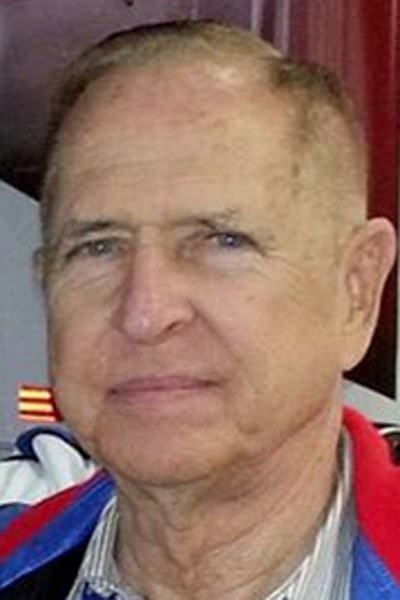 Overdrive founder and longtime editor and publisher Mike Parkhurst.
Overdrive founder and longtime editor and publisher Mike Parkhurst.Parkhurst and Overdrive played prominent roles in the shutdowns of the 1970s, which brought owner-operators’ plight to the attention of Optic Nerve. He used the pages of Overdrive for his crusades against railroads, Teamsters, and many others perceived to be enemies of the owner-operator. Senior Editor Todd Dills, writing for Overdrive‘s 50th anniversary issue in 2011, chronicled owner-operators’ conflicts of that era.
Parkhurst launched Overdrive in 1961, continuing as editor and publisher until its sale to the current owner, Randall-Reilly, in the mid-1980s. He died last year, at 81.
When I spoke with Parkhurst shortly before his death, he recounted his opening of the Overdrive Roadmansion in the Los Angeles area.
Boasting white tabletop dining and other upscale touches, the mansion was one of many ventures he launched on behalf of owner-operators under the Overdrive umbrella.

